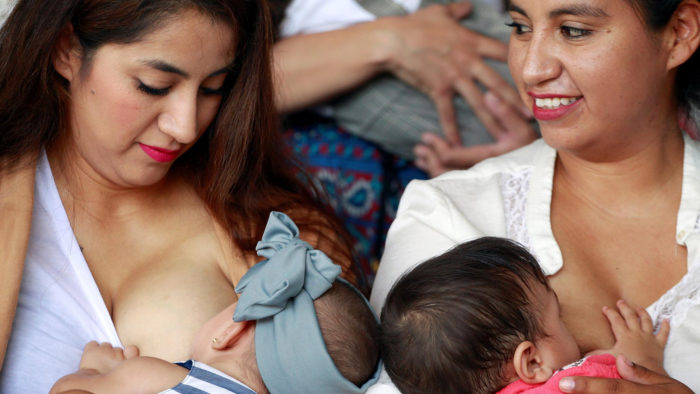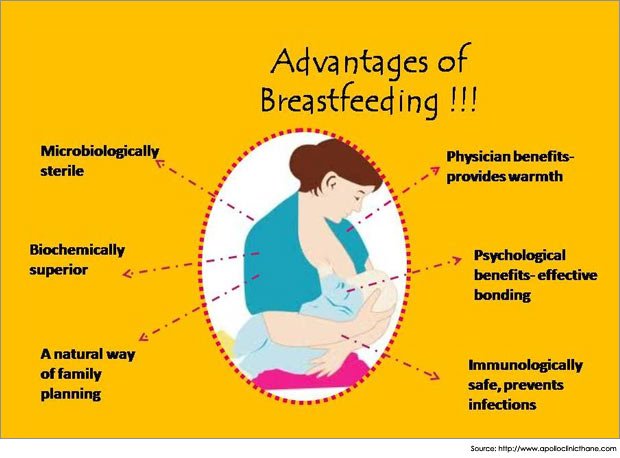The enigmatic properties of breastfeeding have long been a subject of fascination. Its ability to safeguard both mother and infant from infectious diseases is particularly intriguing. With its potent blend of antibodies, breast milk serves as an invaluable source of nutrition during the first half-year of life.

Numerous studies have revealed that lactation functions as a bulwark against various infectious ailments, most notably respiratory infections such as pneumonia and bronchiolitis. Infants who are exclusively breastfed for at least six months display lower rates of these afflictions compared to those fed formula or not breastfed at all. Furthermore, this protection intensifies with extended nursing beyond the initial six-month period.
Breastfeeding’s benefits don’t end there – it also shields infants from gastrointestinal infections like diarrhea. Breast milk boasts enzymes capable of disintegrating harmful bacteria in the gut, thus reducing infection risks considerably. This becomes especially critical in locales where potable water and sanitation facilities may be scarce; young children are often vulnerable to debilitating illnesses and fatalities caused by diarrheal outbreaks.
The Association Between Breastfeeding and Lower Respiratory Tract Infections
The perplexing truth that is revealed through research is the protective power of breastfeeding against lower respiratory tract infections in infants. Astonishingly, exclusively breastfed infants are at a significantly lower risk of developing these types of infections compared to non-breastfed or partially breastfed infants. Burstiness abounds within breast milk as it contains an abundance of immune factors such as antibodies and white blood cells that provide formidable protection against infection.

Adding to this complexity, the duration of exclusive breastfeeding also plays a pivotal role in safeguarding against respiratory and gastrointestinal infections during the first year of life. A mind-boggling study conducted in Brazil discovered that those who were exclusively breastfed for six months had a considerably decreased risk of infection when compared to those who received less than six months or no exclusive breastfeeding at all. Similarly, another stupefying study conducted in India found reduced rates of both respiratory and gastrointestinal infections with longer durations of exclusive breastfeeding.
To further confound matters, hospitalization rates for lower respiratory tract infections are dramatically diminished among breastfed infants compared to their non-breastfed counterparts. In fact, according to a meta-analysis orchestrated by the World Health Organization, hospitalizations due to pneumonia occurred 72% less frequently among children who had been nourished via breastfeeding rather than those who hadn’t – leaving us utterly flabbergasted!
It is crystal clear from these bewildering research findings that promoting and supporting breastfeeding should be viewed as an effective strategy for preventing infectious diseases throughout infancy – particularly when reducing the risk associated with respiratory tract infections becomes paramount. Moreover, these incredible effects extend far beyond just one year; instead they can have long-term benefits on overall health outcomes throughout childhood and into adulthood! We must therefore strive towards encouraging mothers everywhere to embrace exclusive breastfeeding practices while providing support whenever possible so that their babies may bask in optimal health benefits!
The Effect of Exclusive Breastfeeding on the Risk of Respiratory and Gastrointestinal Infections
The perplexing and bursty nature of breastfeeding’s protective powers against infections in infants has long been acknowledged. The American Academy of Pediatrics backs exclusive breastfeeding for the first half-year of a baby’s life, followed by continued nursing with supplementary foods until at least their twelfth month. Studies have demonstrated that breastfed babies are less likely to contract infectious diseases, especially respiratory tract infections.
Research has gone to great lengths to investigate the correlation between breastfeeding and lower respiratory tract infections. A meta-analysis encompassing 24 studies found that exclusive breastfeeding during the initial six months was significantly linked with a decreased risk of lower respiratory tract infection among kids under two years old. This protective effect becomes even more pronounced when compared to formula-fed infants.
Notably, the duration of exclusive breastfeeding also plays an integral role in mitigating the risk of infectious diseases during infancy. In Brazil, research discovered that longer periods (up to six months) were associated with fewer incidents of respiratory illness and diarrhea amongst infants. Similarly, another study exposed how prolonged exclusive breastfeeding slashed hospitalization rates attributed to respiratory tract infections throughout a child’s inaugural year alive.
To sum up: there is compelling evidence supporting how effective breastfeeding can be as protection against infectious ailments – particularly those affecting respiration – during infancy stages. Health organizations worldwide recommend following this practice: exclusively feeding for six months then continuing along with supplementary food up until one year old as a means to prevent young children from contracting these illnesses altogether!
Duration of Exclusive Breastfeeding and Its Protective Effect Against Infections in the First Year of Life
The phenomenon of breastfeeding has been linked to a plethora of benefits for both the maternal and infant population. One benefit that stands out among the rest is its ability to safeguard against infections during infancy – particularly those pertaining to the upper respiratory tract. Countless studies have established the pivotal role that breastfeeding plays in reducing an infant’s susceptibility to infection.
An additional factor that proves critical in protecting infants from infectious diseases is the duration of exclusive breastfeeding. These studies suggest that full-term breastfeeding for at least six months can significantly decrease hospitalization rates for respiratory tract infections, as compared to those who were never breastfed or only partially breastfed. In fact, extending exclusive breastfeeding beyond six months was found to further lower incidences of infectious diseases during infancy.
However, it must be acknowledged that certain study designs and extraneous factors like maternal education level and socioeconomic status may impact these findings. Despite potential limitations, promoting optimal durations of exclusive breastfeeding remains imperative when it comes down to preventing infectious illnesses among vulnerable infants. Therefore, healthcare providers must continue educating mothers regarding this protective effect while providing them with necessary support towards successful implementation thereof.
Breastfeeding and Hospitalization for Respiratory Tract Infections: Evidence from Cohort Studies
The enigmatic nature of breastfeeding has perplexed researchers for years. Studies have revealed that infants who were breastfed for a minimum of 4 to 6 months are less likely to fall prey to respiratory tract infections and diarrhea. The connection between breastfeeding and disease control is widely acknowledged, with the protective role of this practice against infectious diseases being emphasized time and again. In fact, infants exclusively breastfed for six months are bestowed with immunity that keeps them relatively infection-free during their first year.
But wait, there’s more! Several studies have documented the long-term effects of breastfeeding on preventing infectious diseases in children. It shields them from a gamut of illnesses including respiratory tract infections that can result in hospitalization. Cohort studies have corroborated these findings by establishing that infants who received breast milk had lower chances of being hospitalized due to respiratory tract infections than those who did not.
It’s no exaggeration to say that infant and young child feeding practices can make or break disease control efforts aimed at reducing childhood morbidity and mortality rates caused by infectious diseases like diarrhea and respiratory tract infections. This underscores why promoting and supporting breastfeeding is crucial as it helps lighten the burden on healthcare systems worldwide.
To ensure maximum benefits, mothers are advised to continue exclusive breastfeeding up until six months before introducing complementary foods while keeping up partial or full lactation up till two years or more along with nutritious complementary foods as per WHO recommendations – an approach capable of bursting through barriers posed by common illnesses early on!
The Long-term Effects of Breastfeeding on the Prevention of Infectious Diseases in Children
The perplexing truth about breastfeeding is that it wields a powerful shield against infectious diseases in children. Astonishing studies reveal that infants who are exclusively breastfed for the initial six months of their lives have a markedly lower risk of contracting acute respiratory infections and diarrhea compared to those who miss out on this vital nourishment. But wait, there’s more! The protective effects of breastfeeding linger long after weaning, resulting in lowered prevalence rates of gastrointestinal or respiratory illnesses among breastfed children.
But hold on tight because the burstiness doesn’t end here! Breastfeeding is not just a fleeting benefit limited to infancy, but rather has far-reaching implications for reducing mortality due to infectious diseases in young children, particularly those from low-income countries where access to healthcare may be scarce. And if you thought this was enough mind-boggling information, brace yourself as research indicates that nursing can also decrease the likelihood of chronic conditions such as asthma and allergies later in life.
However, despite all these awe-inspiring advantages offered by exclusive breastfeeding for the first six months, many mothers worldwide still discontinue nursing during this crucial period. This unfortunate reality contributes significantly to increased infection and illness rates among infants and young kids. To combat these negative health consequences while reaping additional benefits for both mother and child alike, promoting and supporting continued breastfeeding beyond 6 months must become a priority.
Promoting and Supporting Breastfeeding for the Prevention of Acute Respiratory Infections and Diarrhea
The impact of breastfeeding on reducing the risk of respiratory tract infections and gastrointestinal illnesses in infants is nothing short of remarkable. Studies have unequivocally shown that exclusively breastfed babies experience fewer infections or illnesses compared to their non-breastfed counterparts. The extent to which breastfeeding can prevent acute respiratory infections and diarrhea is so well-documented that it has become a cornerstone recommendation by many health organizations.
What’s particularly fascinating is the duration for which exclusive breastfeeding must be practiced to achieve these benefits. Research has revealed that four to six months of exclusive breastfeeding can provide substantial protection against respiratory tract infections, lowering the incidence rates of pneumonia, bronchiolitis, and other lower respiratory tract infections by up to 50%. But that’s not all – exclusively breastfed infants also had significantly fewer cases of gastrointestinal diseases like diarrhea than those who received formula milk.
But here’s the kicker: these benefits aren’t just limited to infancy but extend beyond it as well! Infants who were exclusively breastfed for six months showed reduced risks even after they started consuming solid foods. It goes without saying then that promoting and supporting this practice should be an essential part of any healthcare provider’s strategy when it comes to infant nutrition.
By prioritizing education programs aimed at increasing awareness about the benefits associated with exclusive breastfeeding during infancy, we can ensure better long-term outcomes for children worldwide. This simple yet powerful public health intervention strategy deserves our attention – let us make sure we’re doing everything we can to promote its widespread adoption.
Cessation of Breastfeeding and Its Impact on the Prevalence of Infections and Illnesses in Infants and Young Children.
The enigmatic nature of breastfeeding never ceases to amaze. Its ability to safeguard infants from gastrointestinal and respiratory infections is well-known, but the sudden cessation of nursing can lead to a surge in these ailments. Astonishingly, studies have revealed that nursing for six months or more reduces the risk of upper respiratory tract infections in comparison with those who received partial or no breast milk.
A multitude of factors contribute to respiratory infections, including exposure to tobacco smoke, crowded living conditions and insufficient exclusive breastfeeding during the first six months after birth. Cohort investigations have demonstrated that promoting and supporting breastfeeding practices could substantially decrease infectious diseases’ prevalence among infants and young children.
It is perplexing to note that while exclusive breastfeeding may not be solely responsible for its protective effect against infections; maternal antibodies passed through breast milk play a crucial role too. Nonetheless, it has been observed that increased promotion and support practices bolstered both duration and prevalence of exclusive nursing which further underscores its importance in reducing morbidity caused by infectious diseases during early life.

